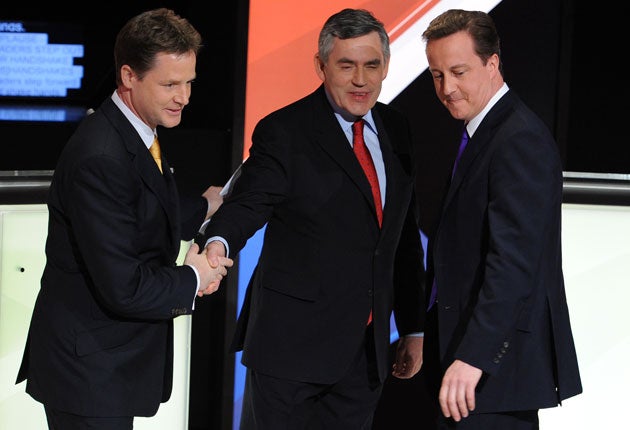With 11 days to go and polls suggesting a hung parliament, what secret deals are going on?
The main parties are preparing the ground for talks about the post-election balance of power

Even on the streets of Afghanistan Nick Clegg is a hero. His direct, bouncy style has won admirers far beyond the millions who witnessed his performances in the first two televised leaders' debates. In Kabul, Accra and Dhaka, most of those who watched the programmes backed the Liberal Democrat leader. "I'll be voting for Nick," said Shakib Shariffi, a democracy campaigner in Kabul, who is participating in an innovative "vote-swapping" scheme. "I just think he was the most honest."
The question is whether Mr Clegg's new-found popularity can last long enough back home to grant him a central role in the construction of the UK's next government.
The Conservatives began the election campaign stridently against the possibility of cobbling together a coalition to rule in a hung Parliament. Even after Mr Clegg skewed the polls with his game-changing performance in the first debate, David Cameron clung to his resistance – motivated by an objection in principle to deals with the Lib Dems.
Labour has been quicker off the mark. From Gordon Brown's repeated attempts to "agree with Nick" during the first debate, the Labour leadership has been clearing the lines of communication. The two parties have a history of co-operation, at Westminster and in Scotland. While the young Mr Clegg dislikes Mr Brown, his senior colleague Sir Menzies Campbell enjoys a closer relationship with the Prime Minister. Sir Ming is a veteran of the previous occasion, in 1997, when such a deal was mooted. Then Labour considered, but opted out of, a deal and Tony Blair turned his back on electoral reform. However, Gordon Brown's recent sympathy for adopting a new electoral system has encouraged those who favour a deal. David Cameron has always opposed changing the system, but some believe that if he felt reform was unavoidable, he would favour a more proportional system than Labour has been willing to countenance.
It is rumoured that Lord Mandelson is considering lining up a replacement for Mr Brown – with David Miliband the most likely – to meet the bottom line of any pre-election demands from the Lib Dems. The loyal Children's Secretary, Ed Balls, has dismissed such speculation – but significantly now concedes that Labour could work with Mr Clegg.
"The one thing we and pretty much all the Lib Dems I know are agreed on is that a Conservative majority government is absolutely the worst outcome," Mr Balls said. Whether he is simply speaking to the Lib Dems over the heads of the media or repeating communications already being delivered behind the scenes, it is a powerful a message.
It is clearly being heard by the most resolute refuseniks within Mr Cameron's high command, and the most senior figures are responding.
Kenneth Clarke contributed to the thaw yesterday, when he said the Tories' "starting point" for coalition would be a refusal to compromise on their economic plans. Although Mr Clarke also said he did not expect a Con-Lib pact he was still sketching the outline of one which could work.
If Mr Clegg could not face making any advances himself, he could ask his wife to help. Miriam Gonzalez Durantez used to work with Ed Llewellyn – now Mr Cameron's chief of staff – in Lord Patten's office. Conveniently, they also shared an office with Lord Mandelson's press secretary, Peter Power.
The final debate, this week, will concentrate on the economy, which is Mr Brown's strongest suit. A Brown recovery on the back of it could whittle away at the Lib Dems' standings, as much as at the Tories'.
More generally, much will depend on whether the Brown plan to put himself at the heart of the Labour campaign succeeds, or backfires fatally. The strategy, tried out at several engagements yesterday, will be on display in London today when Mr Brown personally launches Labour's "green manifesto".
The Conservatives, while maintaining efforts to underline Mr Clegg, promise "a more positive campaign" this week, concentrating on what they promise to do for Britain, rather than criticising their opponents.
Getting ready for the third TV debate
Nick Clegg
What he needs to do Carry on with his message that the Lib Dems can make a difference to the "old politics" status quo. Highlight plans to raise income tax threshold to £10,000 and a mansion tax on homes worth more than £2m.
Potential pitfalls Lack of experience on the economy could expose him as a two-hit wonder.
Gordon Brown
What he needs to do Focus on the headline message: that the Government must keep spending to prevent a "double-dip" recession that is more likely under Tory cuts. Continue to push the "substance" message.
Potential pitfalls Just 0.2 per cent growth in the economy at start of year, so Cameron and Clegg will say that Labour hasn't secured recovery.
David Cameron
What he needs to do Challenge Brown's "experience" message by highlighting Labour's "jobs tax" of an NI rise next year, while squaring this with Tory plans for big public spending cuts this year. See off Clegg by showing more flair.
Potential pitfalls This is his last chance to get ahead in polls, so he cannot afford a single slip.
Join our commenting forum
Join thought-provoking conversations, follow other Independent readers and see their replies
Comments